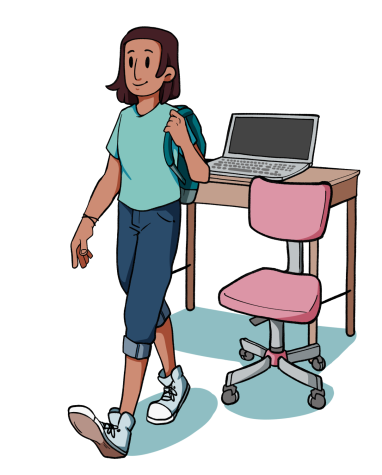What to expect when you’re expecting nursing school: My version
Hello, lovely readers! The winter weather has crept upon us–every now and then at least–deciduous trees are once again shedding their leaves, and those of us at CSU are beginning to savor a long awaited break. Long time no see, right? You may, then, be able to guess what that means: I have completed my first semester of nursing school! Huzzah! One semester (out of four) down…which means that I at long last have some of my own tips and tricks to share with those of you who are choosing to pursue the golden path of nursing. Without further ado, here is some of my personal nursing school advice based on my own experiences this past first semester:
- The most important tip that I can provide regarding exam questions is to never doubt and overthink your first answer. I typically would never encourage this, but in the case of nursing school exams, trust your gut feeling. This tip alone is how I personally transitioned from scoring B’s on my exams to A’s.
- You will be repeatedly told to choose the answer on an exam that is “least likely to kill the patient” (or that, basically, is most important to sustain the immediate life and health of that patient). This is because nursing school intends not only to train competent nurses but to train nurses who are able to respond quickly and aptly in emergency situations–nurses who are able to use critical thinking skills to determine what needs to be done first. However, while this is certainly a critical thinking skill, don’t let it confuse you on exams by causing you to become overly fixated on patient safety and health (in the questions that is); sometimes, the answers are more straightforward and simple, some even purely definition-based (but not many!). Thus, when answering exam questions in nursing school, keep in mind that prioritizing patient safety and health will almost always predominate, but if there is an answer that logically answers the question, choose that one!
- Focus on the key words in exam questions, such as “priority” or “initial.” These can change the entire context of the question and thus also the answer. This means that you really must pay close attention to the wording of the question (and the answers!). Often, there is more than one (overall) right answer, but the correct answer is based on the specific situation offered in the question, and it doesn’t take more than one word to alter that.
- Usually, when there is an abnormal finding when assessing the patient (e.g., edema, heat, and erythema of a patient’s lower leg–which may be indicative of venous insufficiency), you would report it to the provider as soon as possible. The exception would be if you have more information to gather through assessments and if the situation isn’t an emergency; in those cases, you would want to gather the additional information before informing the provider. This will help with both exam questions and in practice.
- After each exam, write down the questions and answers that you missed immediately after finishing and uploading your exam. (Side note: If you end up using Examplify for your exams, absolutely make sure you REVIEW before you upload, not only so that you can pinpoint your weaker areas but also so that your exam can actually be located and graded.) After each exam, I would quickly pull up a Microsoft Word document entitled “Final Exam Hints” and would record the questions and answers that had appeared in my review section. Sometimes, I would also include general topic areas that seemed to pop up more throughout the exam so that I had a better idea of what to focus on most when studying for the cumulative finals. And yes, I will say that again: The final exams are cumulative, so you would benefit from studying well ahead of each individual exam and continuing to review them as time permits. Additionally, some students went back through their class topics lists and would highlight any areas that had several questions in the exam.
- In addition to studying for exams, you will also be practicing clinical nursing skills–either in an actual clinical setting or in the nursing lab(s). I recommend practicing your skills at least twice a week outside of lab, if not more.
- With nursing school comes the dreaded heaps of readings. I honestly loved everything I learned and read, but even I quickly became overwhelmed by the amount of reading per week, so my next tip is this: Only read if you can fit it into your schedule or if your professor specifies certain boxes or sections to read. Another exception would be if your professor merely skims over the material, such as was the case with Mrs. Tyler in Health Assessment; in those instances, I highly recommend reading each corresponding chapter and highlighting the main points and abnormal findings. Therefore, for most classes (again, at least in the first semester), I recommend simply studying the PowerPoints and only referring to the book if you don’t fully understand something. (But also remember that YouTube and other sites can be very helpful as well!) For example, I do not recommend studying for Pathophysiology because there ended up being well over 100 pages for that class alone per week; that’s a lot of time you could be devoting to studying.
- PrepU, while not perfect, is your new best friend in nursing school (if you still use ThePoint). The practice quizzes help introduce you to the style of questions that will appear on your nursing school exams and even on the NCLEX. They will also, of course, test your knowledge of the chapter content, so keep in mind that if you didn’t read the chapter, you may not perform as well as expected, but this shouldn’t hold you back! I alway aimed for a mastery level of eight per chapter, but I would continue practicing even past that, especially in preparation for exams.
- One distinction between classes’ grading I would like to point out (though this may change with time) is that the Professional Clinical Nursing virtual simulation labs require only a passing grade whereas the Health Assessment vsims are graded based off of your actual score (i.e., if you scored an 88, that is what is put into the gradebook).
- Probably the most important tip that I can give is to take breaks ad lib. As long as you plan out all of your assignments and divide up your work each day, you will most definitely be able to squeeze in time for yourself. For example, I was able to take time off between eight PM and ten PM each night, and I also took off at least half a day each weekend, sometimes a full day. Just plan it out according to your own preferences and needs!
Nursing school is challenging, rigorous, and time-consuming, but if you are truly meant for it, you will enjoy it every step of the way. Despite the stress I endured my first semester, especially with the inconveniences of COVID, I felt invigorated each day because of my passion for the information I was learning. I hope the same for those of you reading this. Stay strong in the face of adversities that come with nursing school, COVID-19, and life in general; I’ll be cheering you along the way!
Nursing students unite!
















Shammy Peterson • Aug 12, 2021 at 9:09 pm
I found it interesting when you said that you can expect to practice clinical nursing skills. As you said, you recommend practicing skills at least twice a week. This is something that I will share with my daughter who is interested in becoming a nurse in the future. She is planning to take up the Associate of Science in Nursing Program, and it would surely be helpful if she would be aware of the things that she could expect. Since she was 5, she has been wanting to become a nurse, so I feel happy for her. https://www.npti.edu/associate-of-science-degree-in-nursing.php